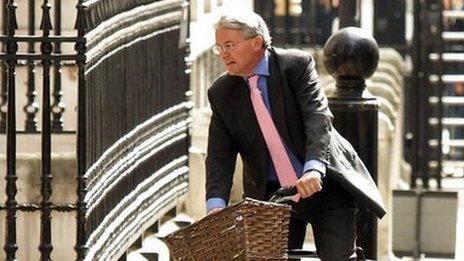Andrew Mitchell's life and career
- Published
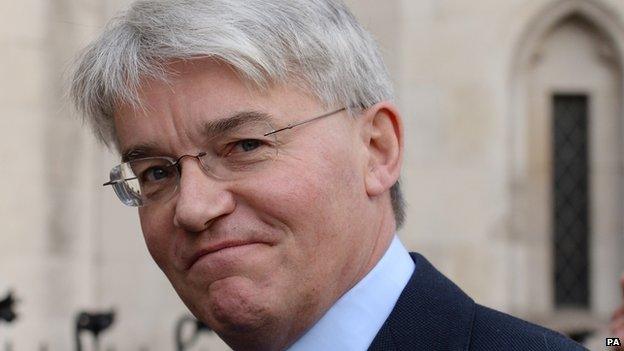
The question of what was said at the gates of Downing Street on 19 September 2012 has dominated press coverage of 58-year-old Andrew Mitchell for over two years.
The former soldier and self-confessed "stern disciplinarian" resigned as chief whip a month after the Sun's front page story on his row with police, but has always said he did not use the word that led to the episode being dubbed "plebgate".
The eventual libel trial, which he has now lost, placed his personality in the spotlight, with one police officer saying in court he had "never met anyone quite like" the former international development secretary, who he had accompanied on two foreign trips.
Insp Duncan Johnston said Mr Mitchell had been "prone to temper tantrums" and "unpleasant until he got what he wanted".
And a former Parliamentary security guard said the MP for Sutton Coldfield had told him he was "too important" to stop his bicycle for him in 2005, a claim dismissed as a "caricature" by Mr Mitchell's counsel.
In written evidence, Musician Bob Geldof described the MP as an "advocate for the less fortunate" and a "good man", saying he had never heard him "use the ridiculous and archaic expression 'pleb'".
Journalists, political allies and Mr Mitchell's decorator also gave supportive statements.
'Thrasher' nickname
Before his row with police, Mr Mitchell had a ministerial career which began as a junior whip in the early nineties.
He was first elected in 1987, having grown up in a political household - his MP father Sir David Mitchell served as a minister under Margaret Thatcher.
He was educated at Rugby public school, where he is said to have earned the nickname "Thrasher".
He read history at Jesus College, Cambridge where his extra curricular activities included chairing the student Conservatives and becoming President of the Cambridge Union.
Before going to university, Mr Mitchell served in the Royal Tank Regiment and as a UN peacekeeper in Cyprus.

In brief
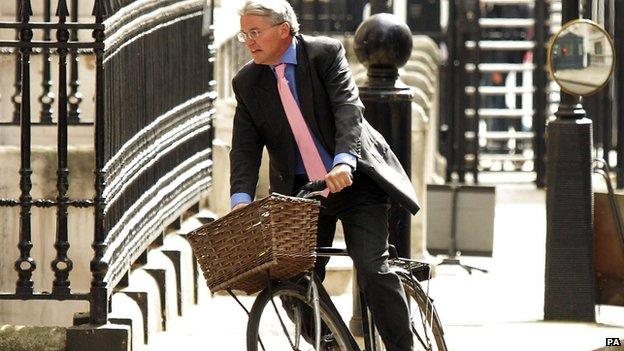
Aged 58 years old and married to a doctor. They have two daughters
Father was a Conservative politician and minister under Margaret Thatcher
A former soldier who served as a UN peacekeeper in Cyprus in the 1970s
Entered Parliament in 1987 and was a whip during the Major government
Lost his seat in 1997 but returned to Parliament four years later
Appointed international development secretary in 2010 and became Tory chief whip in 2012
Resigned soon afterwards after being accused of calling police officers "plebs"

But upon graduating he moved into the world of banking, taking up a role with investment bank Lazard Brothers.
During this time he got married to Sharon, a doctor. They have two daughters.
He was determined to get into politics and, having failed to get elected in 1983 in Sunderland South, he won the seat of Gedling in Nottinghamshire in 1987.
Labour landslide
Here he started his career in the whip's office, serving as a government whip during the notorious rebellion over the Maastricht Treaty - where a number of Conservative MPs voted against Prime Minister John Major.
He was made a vice-chair of the Conservative Party and later promoted to be social security minister, and he was tipped as a future chief whip in the mid-1990s.
But his career suffered a setback when he lost his seat in the Labour landslide of 1997.
This brought to an end a decade of serving in the House of Commons alongside his father - who retired the same year.
He returned to Lazard Brothers as a director and began his search for a new, and hopefully safer, seat.
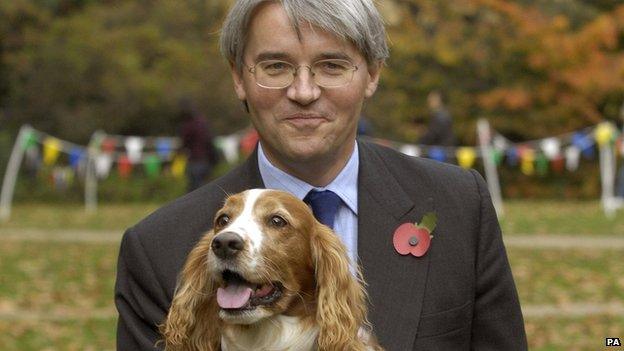
Andrew Mitchell's Welsh Springer Spaniel Molly won Westminster's Dog of the Year contest in 2009
After five other attempts, he beat a large field to succeed Sir Norman Fowler in Sutton Coldfield, where he has built up a large majority since 2001.
Back inside the Commons, he got involved with the party's leadership machinations as it tried to find someone to take on Tony Blair.
As early as October 2002 he was named by the Daily Telegraph as one of four ringleaders in a plot to oust then leader Iain Duncan Smith.
He found favour with Mr Duncan Smith's replacement, Michael Howard, who promoted him into the shadow cabinet as shadow international development secretary after the 2005 general election.
Short-lived
He ran David Davis's failed leadership campaign in 2005, but kept his shadow cabinet job under David Cameron's regime, and was seen as a Cameron loyalist.
Mr Mitchell stayed in the shadow international development role all the way through to the 2010 general election, after which he took the post on in government.
He oversaw moves to make aid more transparent and repeatedly pledged to enshrine in law an obligation for the UK to spend 0.7% of its national income on overseas aid - something which angered some of his Conservative colleagues.
When David Cameron carried out his first major reshuffle in early September 2012, he made Mr Mitchell his new chief whip. But it was to be a short-lived appointment.
The following month, following weeks of pressure, he resigned, telling Mr Cameron "damaging publicity" over the row with police officers meant he could no longer do his job.
- Published27 November 2014
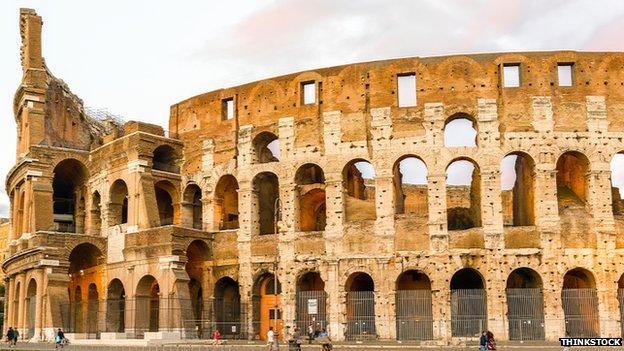
- Published27 November 2014
